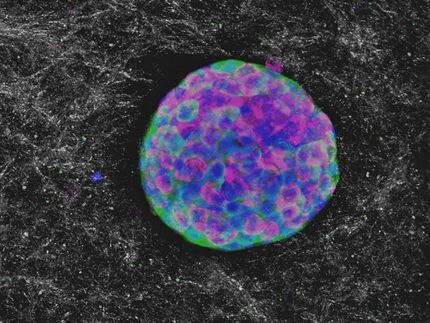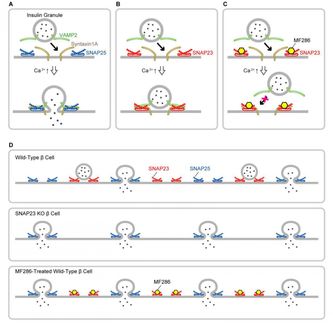New Study Reveals Signaling Pathways Required for Expansion of Pancreas Stem Cells
A team of scientists at The Scripps Research Institute has published a new study (Journal of Biological Chemistry) of important signaling pathways that are required for the expansion of pancreas stem cells, work that may lead to strategies to prevent or reverse insulin-dependent diabetes mellitus (IDDM). IDDM, which used to be referred to as Type 1 diabetes, results from selective destruction of insulin-producing pancreatic islet beta cells by the body's immune system. Islet beta cells are spread throughout the pancreas and are made up of two types of cells: alpha cells, which make glucagon, a hormone that raises the level of glucose (sugar) in the blood, and beta cells, which make insulin.
"Our work focused on guiding stem cells, or pancreas progenitors, to differentiate into beta cells. This approach required that we increase the number of pancreas progenitors by finding the signals that cause them to proliferate. It also required that we understand the 'cues' that activate stem cells to turn into insulin-producing beta cells," says Nora Sarvetnick, Ph.D., a Scripps Research professor in the Department of Immunology.
The overall goal of this five-year study, funded by the National Institutes of Health, was to discover the roles of two proteins-BMP4 and Id-in causing proliferation or expansion of pancreatic progenitors. Hong Hua, a postdoctoral fellow in Sarvetnick's lab, was the lead author of this study.
The progression of pancreatic stem cells to beta cells is governed by the expression of key proteins, including a class of proteins called bHLH transcription factors that regulate gene expression. Ids (inhibition of differentiation factors) are a family of proteins implicated in a number of cellular processes, including cell proliferation. The major role of Id proteins is to bind to, and inhibit, the function of bHLH proteins, including those that are important in pancreas development. Therefore, Id proteins could bind to bHLH proteins in the developing pancreas and prevent them from differentiating into mature insulin-producing cells and, at the same time, cause them to proliferate.
"Interestingly, the expression of Id proteins is induced by bone morphogenetic proteins (BMPs) targets in another cell type," says Sarvetnick. "We wanted to know whether BMP can cause an increase of Id expression, and if this would result in proliferation of the stem cells."
Her work incorporated several techniques to test these hypotheses, including the use of pancreas progenitor AR42J cells and transgenic mouse models. The team's data demonstrated that BMP4 signaling is necessary and sufficient for proliferation of AR42J progenitor cells, and that this growth is correlated with an increase in Id expression. The group also did immunohistochemistry staining to show that BMP and Id proteins are found in abundance in the embryonic mouse pancreas, which contains proliferating stem cells.
A possible source of pancreatic progenitor cells is thought to derive from pancreas epithelial duct cells. The pancreas of the mouse model that the Sarvetnick lab used contains an abundance of regenerating stem cells from the ducts. "Importantly, we found that if we inject an antibody that inhibits BMP4 into these mice, this significantly reduced the number of proliferating duct cells. We also found that in these mice inhibition of BMP4 results in an increase in the expression of a bHLH protein-dependent factor PAX6, which is required for the final differentiation of pancreatic islet cells."
The group's results indicate that BMP4 stimulation blocks the differentiation of endocrine progenitor cells through induction of Id, which, in its dual role, promotes their expansion, revealing a novel paradigm of signaling that explains the balance between expansion and differentiation of pancreatic epithelial progenitors.
Most read news
Other news from the department science

Get the life science industry in your inbox
By submitting this form you agree that LUMITOS AG will send you the newsletter(s) selected above by email. Your data will not be passed on to third parties. Your data will be stored and processed in accordance with our data protection regulations. LUMITOS may contact you by email for the purpose of advertising or market and opinion surveys. You can revoke your consent at any time without giving reasons to LUMITOS AG, Ernst-Augustin-Str. 2, 12489 Berlin, Germany or by e-mail at revoke@lumitos.com with effect for the future. In addition, each email contains a link to unsubscribe from the corresponding newsletter.





















































